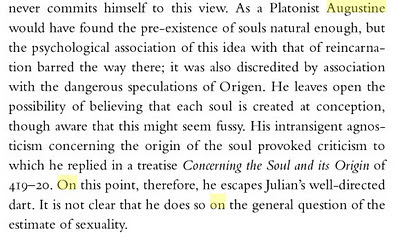Now, it is quite possible that I have read about this particular translation issue before, but have forgotten it. Nonetheless, this translation issue was noted in a book I picked up at the Lifeline Bookfest yesterday (yes, Brisbane people - you have until next weekend to load up on books you probably won't finish before the next one comes around), but a simpler explanation is to be found via Google books, which turned up this extract from Hans Kung book "Great Christian Thinkers":
One other thing occurred to me about this - and I presume this is not an original thought - until Catholic scientist priest Spallanzani, who I mentioned here several posts back - did his 18th century work, mammalian reproduction as requiring both ovum and sperm was not well understood, and the idea that semen alone contained a tiny human just waiting to be planted and grow up was one way of understanding it. Logically, then, there was a sense in which one man's seed also contained all the future babies as well as his own.
Would such thinking contribute to the way in which Augustine might have thought all humans were "in" Adam, and (in a sense) were quasi-participants in the original sin?
Update: Another book (Augustine of Hippo - a life" by Henry Chadwick ) notes the following, which seems relevant to my speculation:
Update 2: It may not have been Augustine's idea, but we do find in the Wikipedia entry for homunculus that some later thinkers thought that "preformationism" was relevant to original sin:
It was later pointed out that if the sperm was a homunculus, identical in all but size to an adult, then the homunculus may have sperm of its own. This led to a reductio ad absurdum with a chain of homunculi "all the way down". This was not necessarily considered by spermists a fatal objection however, as it neatly explained how it was that "in Adam" all had sinned: the whole of humanity was already contained in his loins.Actually, the Wiki entry on preformationism is worth looking at too, for a more detailed look at its development in philosophy and its lasting influence. It all starts with Pythagoras, apparently. When microscopes came along, the dutch inventors gave preformationism a boost by claiming to see (in a fashion which reminds me of how, much later, Martian canals would be imagined via telescopes) things in semen that simply aren't there:
Dutch microscopist Antonie van Leeuwenhoek was one of the first to observe spermatozoa. He described the spermatozoa of about 30 species, and thought he saw in semen, "all manner of great and small vessels, so various and so numerous that I do not doubt that they be nerves, arteries and veins...And when I saw them, I felt convinced that, in no full grown body, are there any vessels which may not be found likewise in semen." (Friedman 76-7)[7]But, going back to Augustine, it would seem that he does not really count as a preformationist:
St. Augustine and St. Thomas Aquinas both held that hominization, or the coming into being of the human, occurs only gradually. Quickening was thought to occur around 40 days, and to be the point at which the merely animal mix of material fluids was ensouled. Until 1859, when Pope Pius IX decreed that life begins at “conception,” the Church was epigenetic along with the Aristotelians [see Maienschein 2003].




2 comments:
eph ho does not equal 'because'.
Eph by itself being a contraction of epi equals 'because.'
Ho = which.
eph ho = because of which.
mortality because of which all sin
That is, we sin because we are mortal.
This is the meaning of Romans 5:12.
The argument, in other words, is the opposite from what is usually represented. Not all die because all have sinned -- rather all sin because all are dying.
Post a Comment